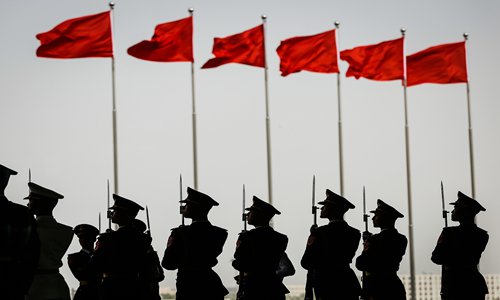


Members of the People's Liberation Army honor guards prepare to welcome foreign delegations to the Belt and RoadForum for International Cooperation which will be held in Beijing on Sunday and Monday. Photo: IC
Chinese investments related to the Belt and Road initiative have totaled $60 billion since 2013 and a large portion of outbound investment in the future will go to countries joining the initiative, a State planning agency official said on Friday.
Ning Jizhe, vice chairman of the National Development and Reform Commission, told a news conference in Beijing ahead of a forum on the initiative that China's total outbound investment will reach $120 billion to $130 billion a year over the next five years.
That would amount to $600 billion to $800 billion in total, Ning said, adding "this will be a big driving force for a steady recovery in the global economy, and for free trade and investment."
The scrutiny of outbound investments by Chinese regulators will not affect Belt and Road projects, Ning said.
China is set to strengthen its audit of SOE's overseas investments, cooperation with foreign enterprises, financial management system of overseas assets, their operating efficiency, and risk control, news portal Economic Information Daily reported on Tuesday.
On financing, Ning said China Development Bank and the Export-Import Bank of China have extended $110 billion in loans for Belt and Road projects by the end of 2016, and China has signed currency swap deals with countries along the Belt and Road routes totaling 900 billion yuan.
More than 1,500 delegates
A total of 29 heads of state and government leaders will attend the upcoming Belt and Road Forum for International Cooperation, Foreign Ministry spokesperson Geng Shuang announced on Thursday. More than 1,500 special guests from 130 countries will attend the forum and over 4,000 reporters from across the world will cover the event.
The forum marks the highest-profile international meeting on the Belt and Road initiative since China proposed it in 2013.
The US is to send delegates to attend the Belt and Road forum, as it "recognizes the importance of China-proposed Belt and Road initiative," according to a statement released by the US Commerce Department.
Matt Pottinger, a special assistant to the US president, will attend the summit, according to China's foreign ministry.
Japanese Liberal Democratic Party's Secretary-General Toshihiro Nikai has confirmed to attend a high-level conference during the forum.
"The attendance of the US and Japan conveys a positive signal to other Western countries. It shows a positive change in their attitudes and marks a good beginning," Li Haidong, a professor with the Institute of International Relations at China Foreign Affairs University, told the Global Times.
Li noted that "whether the attendance is symbolic or practical depends on whether they feel that they could benefit from the initiative."
Meanwhile, South Korea's presidential Blue House said Friday that five-term lawmaker Park Byeong-seug of the ruling Minjoo Party will head the government delegation attending the forum.
North Koreawill also send an official delegation to the forum, said China's foreign ministry.
"The Belt and Road initiative is expanding its influence in the world as some countries, which used to hold a wait-and-see attitude toward the initiative, have now decided to attend the forum. It showed that the initial benefits of the initiative have changed their passive attitude and attracted them to join the initiative," Ruan Zongze, vice president of the China Institute of International Studies, told the Global Times on Friday.
Ruan said that the US decision to attend the forum is connected to the recent warming of ties between the two countries.
During a meeting at the Mar-a-Lago estate in Florida last month, Chinese President Xi Jinpingtold his US counterpart Donald Trumpthat China welcomes US participation in the Belt and Road initiative.
In about one month following the meeting between the two leaders, China and the US have reached consensus on initial commitments in areas such as agricultural trade, financial services and energy to boost economic cooperation under a 100-day plan.
"South Korea is using the forum as an opportunity to improve the bilateral ties. Japan has previously been conservative and even opposed to it. The attendance shows a big change in the country's attitude, though it still has some concerns," said Ruan.
 Fire brigade in Shanghai holds group wedding
Fire brigade in Shanghai holds group wedding Tourists enjoy ice sculptures in Datan Town, north China
Tourists enjoy ice sculptures in Datan Town, north China Sunset scenery of Dayan Pagoda in Xi'an
Sunset scenery of Dayan Pagoda in Xi'an Tourists have fun at scenic spot in Nanlong Town, NW China
Tourists have fun at scenic spot in Nanlong Town, NW China Harbin attracts tourists by making best use of ice in winter
Harbin attracts tourists by making best use of ice in winter In pics: FIS Alpine Ski Women's World Cup Slalom
In pics: FIS Alpine Ski Women's World Cup Slalom Black-necked cranes rest at reservoir in Lhunzhub County, Lhasa
Black-necked cranes rest at reservoir in Lhunzhub County, Lhasa China's FAST telescope will be available to foreign scientists in April
China's FAST telescope will be available to foreign scientists in April "She power" plays indispensable role in poverty alleviation
"She power" plays indispensable role in poverty alleviation Top 10 world news events of People's Daily in 2020
Top 10 world news events of People's Daily in 2020 Top 10 China news events of People's Daily in 2020
Top 10 China news events of People's Daily in 2020 Top 10 media buzzwords of 2020
Top 10 media buzzwords of 2020 Year-ender:10 major tourism stories of 2020
Year-ender:10 major tourism stories of 2020 No interference in Venezuelan issues
No interference in Venezuelan issues
 Biz prepares for trade spat
Biz prepares for trade spat
 Broadcasting Continent
Broadcasting Continent Australia wins Chinese CEOs as US loses
Australia wins Chinese CEOs as US loses